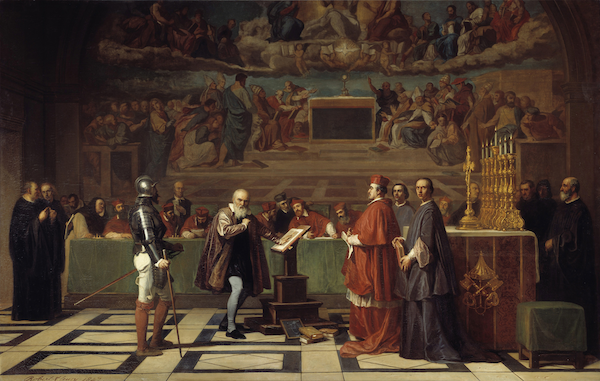Theater Interview: “The New Galileos” — The Price of Freedom
By Bill Marx
“Plays about climate are notoriously difficult, not only because the science is complex and has become politicized, but also because audiences don’t flock to work that shows us the terrifying realities of our world.”

Playwright Amy Berryman, author of The New Galileos. Photo: WAM Theater
On April 15, over 1,000 scientists took to the streets in cities around the world in a week-long protest against the world’s inaction to climate change. There was disappointingly little coverage of this event in the mainstream media, even though some of the scientists were taken into police custody. In Los Angeles, NASA scientist Peter Kalmus and three other people were arrested after they chained themselves to the front door of a Chase Bank building in protest of the company’s investment in fossil fuels.
“We’ve been trying to warn you guys for so many decades that we’re heading towards a f—— catastrophe, and we’ve been being ignored,” said Kalmus, Business Insider reported. “The scientists of the world are being ignored, and it’s got to stop. We’re not joking. We’re not lying. We’re not exaggerating.”
What could be more theatrical than a troop of modern Cassandras, demanding to be heard, denouncing mega-banks for investing in fossil fuels? Unfortunately, most of our theater companies are not all that interested in dealing with the climate emergency — both in terms of what they are producing on stage and informing the public about how green they are becoming (or plan to become). I have written about this sad situation before.
So I was excited to read Amy Berryman’s play The New Galileos, which WAM Theatre is giving a staged reading tomorrow (May 1) at the Berkshire Museum, Pittsfield, MA, at 2 p.m. (You can also view the production via Zoom.) The company’s motto is “where art and activism meet,” and it was a pleasure to read a script in which scientific research is not celebrated as an inspiring end in itself — the perspective of STEM worshipers — but shaped (in some case controlled) by funding sources in the government, big banks, and beyond.
The New Galileos‘ setup is simple enough — three accomplished women scientists who have worked on climate change have been imprisoned by the American government. They are interrogated one by one and given opportunities to regain their freedom. Berryman’s disturbing suggestion is that, in the future, truth-telling scientists will no longer be ignored; they will be silenced via offers they cannot refuse. And there’s the added warning, given the allusion to Galileo, that this organized effort to profit from disseminating disinformation is connected with the rise of authoritarianism.
I asked WAM Theatre director Megan Sandberg-Zakian about why there have been so few script about the climate crisis that look at the collusion of science and capitalism (MIT has yet to divest from fossil fuels) and if the play could be seen as defeatist.
Arts Fuse: A new flagship UN report on climate change indicates that harmful carbon emissions from 2010 to 2019 have never been higher in human history, proof that the world is on a “fast track” to disaster. Scientists argue that it’s “now or never” to limit global warming to 1.5 degrees. Yet a recent report in the Boston Globe indicates that Massachusetts residents have become less concerned about climate change. Boston theaters follow, rather than lead, public opinion, so they are complacently reflecting this dangerous apathy. Why do you think so few plays that address the climate crisis have been produced?

Director Megan Sandberg-Zakian. Photo: WAM Theatre
Megan Sandberg-Zakian: I’m not sure I can hypothesize about the larger Boston or Massachusetts theater ecosystem, but I can speak from my own experience. In 2014, I directed the play Sila by Chantal Bilodeau at Central Square Theater, which took place in the Canadian territory of Nunavut and followed a cast of eight characters, including two polar bears, as they grappled with a rapidly changing environment. At the time, Underground Railway Theater, through their partnership with catalyst collaborative at MIT, was deeply interested in and committed to finding and producing plays about the climate crisis, especially plays based in hard science, and plays that could catalyze needed conversation around climate action in our communities. Finding a play that did both of these things was really challenging at the time. Many more plays have now been written and produced around the world and in the region, including recently The Children at Speakeasy Stage and Ocean Filibuster at ART. Plays about climate are notoriously difficult, not only because the science is complex and has become politicized, but also because audiences don’t flock to work that shows us the terrifying realities of our world.
From my personal experience, I can say that audiences were incredibly disturbed by the hard climate related truths in Sila (which includes the death of a baby polar bear), and the main task of the theater and production became to hold a space for the grief that arose as audiences grappled with the true experience of loss that we are already experiencing and will continue to experience regardless of what kind of political/social action we take.
One of the things I love about that is that it manages to incorporate good science into a suspenseful narrative that feels like it could be a film thriller! More work like this will get audiences excited to be in the theater even with this difficult subject.
AF: The New Galileos is one of the few plays I have encountered that makes a direct connection between the collusion of science and capitalism. Those who pay the bills and hand out grants control the direction that research takes. And they can shut off the spigot at any time. Berryman emphasizes that corruption. We hear, for example, from the government representative that there are plans to abolish the EPA. Don’t you think some will find this cynical? Even defeatist?
Sandberg-Zakian: I can’t speculate about what others will think, but those elements of the play feel incredibly realistic to me. We live in a time where somehow “truth“ has become a relative concept. Our last administration took many actions to weaken and dismantle the EPA. I remember reading a New York Times article last year listing the more than 100 environmental rules that the Trump administration rolled back. That this kind of aggressive action could happen in a short amount of time, and that much of it has been difficult for the current administration to quickly reinstate, speaks to how realistic this is, so I don’t think these elements in the play are far-fetched or defeatist — I think they are clear eyed and important to reckon with. The play asks what each of us individually will do when faced with this kind of government stance, and that’s where I find hope. In my mind, the play points to the role that each of us might play in standing up for what we believe to be true and right.
AF: The New Galileos contains no male characters — even the interrogator is a woman. Why was that choice made, given that most of the people in power — in the government, banks, fossil fuel companies, etc. — are male?
Sandberg-Zakian: I can’t speak to this from the playwright’s perspective. But from my perspective, the fact that all the characters are women points to the fact that women can be, and are, on all sides of the political debate and can use their power, or be used by others, in radically different ways that have nothing to do with their gender. Although there still are not enough, there are more and more women in positions of power, so again this feels like a realistic future to me.

Joseph-Nicolas Robert-Fleury’s Galileo Before the Holy Office, 1847. Photo: WikiCommon
AF: Talk about the challenges that the play presents in terms of staging.
Sandberg-Zakian: This weekend we will just be doing a staged reading at music stands, so I won’t get to delve into staging possibilities. But the joy of a well-crafted play such as this that is both character driven and incredibly well crafted in terms of plot and suspense, is that the staging largely takes care of itself once actors begin playing beats and motivation! I also love the two very different settings, holding cell and interrogation room, that are both really vivid.
AF: The ending of The New Galileos is somewhat Brechtian — it challenges audience members to make up their own minds. Are they choosing a life of comfortable privilege at the expense of the future of the environment? Ideally, what would you like spectators to take away from a production?
Sandberg-Zakian: I hope that folks who see this reading will put themselves in the shoes of each character, and consider what decision they would make in their place. I agree with you about the Brechtian nature of the ending; that’s one of the things I love about the play. Ideally it sparks conversation and generates dialogue, and reminds each of us that the choices we make really matter.
Bill Marx is the Editor-in-Chief of the Arts Fuse. For just over four decades, he has written about arts and culture for print, broadcast, and online. He has regularly reviewed theater for National Public Radio Station WBUR and the Boston Globe. He created and edited WBUR Online Arts, a cultural webzine that in 2004 won an Online Journalism Award for Specialty Journalism. In 2007 he created the Arts Fuse, an online magazine dedicated to covering arts and culture in Boston and throughout New England.
Tagged: Amy Berryman, Berkshire Museum, Megan Sandberg-Zakian, The New Galileos

More inspiration for American artists who take the climate crisis seriously. An essential (for me) political/cultural voice on ways in which we need to transform our relationship to the environment for the sake of preserving the future, journalist/activist George Monbiot, has just announced the opening of a large interactive exhibition, Our Time on Earth, at London’s @BarbicanCentre. He worked on one of segments: “The World Beneath our Feet.” Monbiot says that now the planet “has its own exhibition, and it’s breath-taking. Do come.”